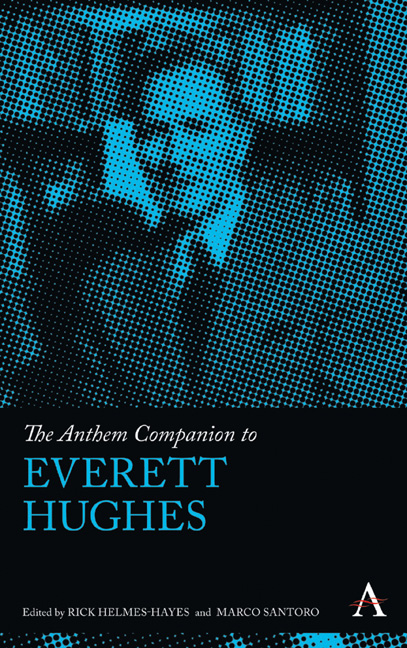Book contents
- Frontmatter
- CONTENTS
- List of Illustrations
- Foreword Everett C. Hughes, Great Teacher
- Insight through Craftsmanship: The Sociological Legacy of Everett Hughes
- Chapter One Everett Hughes and the Chicago Tradition
- Chapter Two Studying “Going Concerns”: Everett C. Hughes on Method
- Chapter Three The Natural History of Everett Cherrington Hughes: A Master of Fieldwork
- Chapter Four Everett C. Hughes: A Key Figure of the Canadian Chicago School Diaspora
- Chapter Five Everett Hughes: Notes from an Apprentice
- Chapter Six An American in Frankfurt: Everett C. Hughes's Unpublished Book on Germans after the End of the Nazi Regime
- Chapter Seven The Origins and Evolution of Everett Hughes's Concept: ‘Master Status’
- Chapter Eight Discovering the Secret of Excellence: Everett Hughes as a Source of Inspiration in Researching Creative Careers
- Chapter Nine Everett Hughes on Race: Wedded to an Antiquated Paradigm
- Notes on Contributors
- Index of Names
- Index of Subjects
Chapter Five - Everett Hughes: Notes from an Apprentice
Published online by Cambridge University Press: 17 June 2017
- Frontmatter
- CONTENTS
- List of Illustrations
- Foreword Everett C. Hughes, Great Teacher
- Insight through Craftsmanship: The Sociological Legacy of Everett Hughes
- Chapter One Everett Hughes and the Chicago Tradition
- Chapter Two Studying “Going Concerns”: Everett C. Hughes on Method
- Chapter Three The Natural History of Everett Cherrington Hughes: A Master of Fieldwork
- Chapter Four Everett C. Hughes: A Key Figure of the Canadian Chicago School Diaspora
- Chapter Five Everett Hughes: Notes from an Apprentice
- Chapter Six An American in Frankfurt: Everett C. Hughes's Unpublished Book on Germans after the End of the Nazi Regime
- Chapter Seven The Origins and Evolution of Everett Hughes's Concept: ‘Master Status’
- Chapter Eight Discovering the Secret of Excellence: Everett Hughes as a Source of Inspiration in Researching Creative Careers
- Chapter Nine Everett Hughes on Race: Wedded to an Antiquated Paradigm
- Notes on Contributors
- Index of Names
- Index of Subjects
Summary
The Teacher
I met Everett Hughes in 1973, as a student in a graduate seminar at Brandeis University. The Sociology Department at that time had what might be described as a split personality: Marxism and critical sociology on one hand, and the Chicago School, reborn, on the other. Everett Hughes, who came to Brandeis from Chicago in 1961 to help establish the Brandeis graduate program, was a living embodiment of the Chicago School. He was 75 years old and in the last years of his teaching career.
I was in my second year of graduate school and knew of Hughes’ importance in the Chicago School. His comments in his seminars and faculty presentations crossed decades, geographies and intellectual traditions; European sociology in the time of Georg Simmel; South America in the context of African slavery, indigenous people and colonizers; professions in the context of the Middle Ages. He would connect circumstances and sociological ideas in a way that struck me as particularly insightful.
So I was not startled when Hughes addressed the seminar: ‘The most revolutionary figure in American history was Henry Ford […] because he realized that every worker assembling a Model T must make enough money assembling the car to buy one'. It is strange that I have such a vivid recollection of that moment. Several students clearly thought this so ridiculous as to be beyond funny. This was not the idea of revolution that was normally spoken about in the department! They were expecting Joe Hill perhaps, or at least Emma Goldman!
I still have his course syllabus from a course on multi-ethnic societies, taught in 1973. It is a one-page mimeograph, listing four books that ‘each student will be expected to have available’. They are Philip Mason’ 1970 Race Relations; Pierre van den Berghe's 1967 Race and Racism: A Comparative Perspective; Robert Park’ 1950 Race and Cultureand Franklin Frazier’ 1957 Race and Culture Contacts in the Modern World. We were to read the books and be orally examined, to write and present papers in which we would investigate one or more issues raised in the texts. I wrote about caste and race in India (where I had spent six months as an undergraduate student) through what Hughes had called ‘dilemmas and contradictions of status’ ([1945] 1971: 141).
- Type
- Chapter
- Information
- The Anthem Companion to Everett Hughes , pp. 133 - 148Publisher: Anthem PressPrint publication year: 2016



